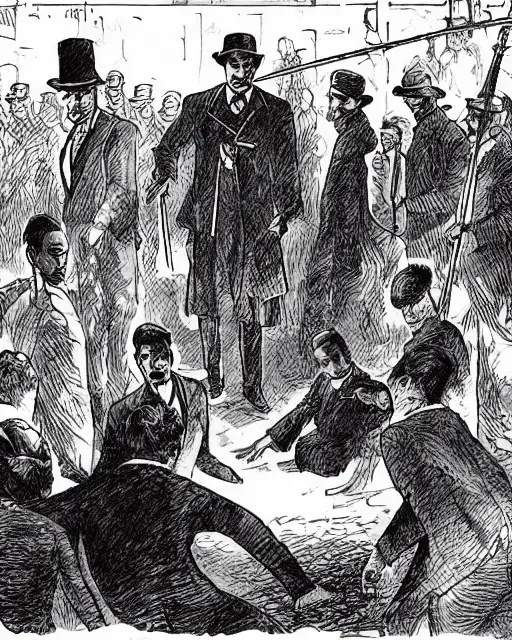What's a good read?
Jose Rizal published two of the Philippines’ most highly revered novels. Noli Me Tangere (1887) and El Filibusterismo (1891) are essential works within the Filipino independence movement. As much more than just literary artifacts, they reflect a profound political message that had a lasting and transformative impact on Philippine history.
Noli Me Tangere
The title of Rizal’s first novel, Noli Me Tangere, is derived from a line in Latin from the Gospel of John; “Noli me tangere et cetera” which translates to “Don’t touch me.” It serves as a call for Filipino independence from Spanish tyranny and oppression. This pioneering work was one of the earliest depictions of Philippine society under Spanish rule and exposed its corruption and abuses of power. The characters in the novel personify different classes in Filipino society at the time, such as landowners, priests, intellectuals, and farmers. By highlighting their struggles against colonial authority, Noli Me Tangere became a symbol of national identity and solidarity amongst Filipinos during the revolutionary period.
El Filibusterismo
The second novel – El Filibusterismo – follows from its predecessor with similar themes but takes an even bolder stance against foreign rule by advocating direct action and armed revolt instead of peaceful dialogue. The story follows two characters – Crisostomo Ibarra, who returns to his native country as Simoun, a wealthy jeweler – as they lead a revolution against corrupt officials. The symbolism of these characters is clear; Ibarra embodies hope whilst Simoun represents despair over oppressive regimes that refuse to change despite all efforts to do so peacefully.
It is no wonder these two seminal works by Jose Rizal have become linchpins for subsequent generations to rally around in pursuit of freedom from colonial tyranny in the Philippines. Their influence goes beyond literature and is passionately celebrated today, with festivals dedicated solely to them. Even though it has been over a century since their publication, Rizal’s novels still resonate strongly with readers throughout Southeast Asia, who continue to draw strength from their enduring messages about justice, equality, and resilience in the face of adversity.
Celebrating Rizal Day
Rizal Day is a prominent national holiday in the Philippines that honors the life and works of José Rizal, one of the country’s most important national heroes. Celebrated each year on December 30th, this special day commemorates the anniversary of Rizal’s execution at Bagumbayan in Manila in 1896. This solemn occasion reminds all Filipinos of the importance and lasting legacy of Rizal’s heroic deeds.
The significance of Rizal Day lies not just in honoring an exceptional historical figure but also in its potential to cultivate an appreciation for one’s heritage and identity among the Filipino people. By embracing Dr. Jose Rizal’s spirit of courage, resilience, and patriotism, Filipinos can gain a greater understanding of their own culture and traditions. In addition to being a day honoring Dr. Jose P. Rizal’s legacy as a martyr who died for his nation’s freedom, it also serves as an opportunity for Filipinos to contemplate upon their sense of nationalism and be inspired by his dedication towards his homeland.
Filipinos show respect on this day by visiting monuments dedicated to Rizal or attending special memorial services or ceremonies held across the country. Flags are raised at half-mast out of respect for those lost during struggles for Filipino independence, including Dr. Jose P. Rizal himself; some schools may even hold assemblies or participate in other activities like essay writing competitions related to nationalism and patriotism where students can express their feelings about national heroes such as Dr. Jose P. Rizal through creative works such as poems, songs, and stories written in his honor.
Furthermore, this meaningful celebration has become part and parcel of Philippine culture over time, with more organizations annually hosting events such as plays depicting important scenes from Philippine history; art galleries exhibiting artworks related to Filipino heroes, film screenings focusing on Philippine revolution-related movies; concerts saluting national heroes through music; radio programs highlighting historic speech excerpts; and many more activities designed to commemorate this memorable date in Philippine history each year with majestic grandeur and reverence throughout the nation.
Cultural Importance
It is clear that celebrating Rizal Day carries great cultural importance for all Filipino people by encouraging them to reflect upon their country’s history while simultaneously instilling within them pride for their homeland so that future generations will be equipped with the knowledge needed to take ownership of their nation’s destiny just like our beloved hero did before us all those years ago when he gave up his life for our freedom so we could live better lives today — a heroic act that shall never be forgotten by generations hereafter so long as there exists an undying love deep within our hearts towards our beloved Philippines!

